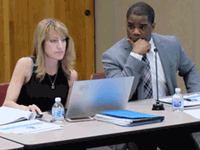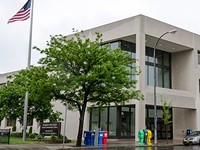[
{
"name": "500x250 Ad",
"insertPoint": "5",
"component": "15667920",
"parentWrapperClass": "",
"requiredCountToDisplay": "1"
}
]
Fifty years ago this week, the racism that has been part of the lifeblood of this country since its founding claimed the life of Martin Luther King Jr. And as we mark the anniversary of King's assassination, it's deeply depressing to re-read books and reports from that period and realize how little progress we've made.
Racial segregation has increased, inequality is a national crisis, white nationalists have marched in American cities, and the current president of the United States has openly encouraged racism and violence and mocked everything King stood for.
In 1964, journalist and economist Charles Silberman was warning the country where our racism was taking us. "Solving the problem of race," he wrote in "Crisis in Black and White," "is not only the most the most urgent piece of public business facing the United States today; it is also the most difficult."
"Nothing less than a radical reconstruction of American society is required," Silberman wrote, "if the Negro is to be able to take his rightful place in American life."
Four years later – just over a month before King's death – the Kerner Commission, appointed by President Lyndon Johnson to study the causes of racial unrest in US cities, issued its own warning.
"Our nation," the commission said, "is moving toward two societies, one black, one white – separate and unequal."
The commission's conclusion from its months of study was simple, and it was damning: "Discrimination and segregation have long permeated much of American life; they now threaten the future of every American."
"Segregation and poverty have created in the racial ghetto a destructive environment totally unknown to most white Americans," the commission said. "What white Americans have never fully understood but what the Negro can never forget – is that white society is deeply implicated in the ghetto. White institutions created it, white institutions maintain it, and white society condones it."
"This deepening racial division is not inevitable," the commission said. "The movement apart can be reversed. Choice is still possible. Our principal task is to define that choice and to press for a national resolution."
"To pursue our present course will involve the continuing polarization of the American community and, ultimately, the destruction of basic democratic values," the commission said. "The alternative is not blind repression or capitulation to lawlessness. It is the realization of common opportunities for all within a single society. This alternative will require a commitment to national action – compassionate, massive and sustained, backed by the resources of the most powerful and the richest nation on this earth. From every American it will require new attitudes, new understanding, and, above all, new will."
There have been no new attitudes, though; no new understanding, certainly no new will.
Observing what is happening today, it seems incomprehensible that we moved so far toward King's dream that we elected Barack Obama president and then chose Donald Trump as his successor.
And yet Donald Trump didn't create the racism that is driving many of his policies, exciting his supporters, and leads Congressional leaders and corporate donors to excuse his massive failings. Donald Trump is simply yet another manifestation of the country's persistent racism.
(Slavery, Alexis de Tocqueville had concluded during his visit to the United States in the early 1800's, "recedes, but the prejudice to which it has given birth is immovable.")
Despite the enormous forces pushing against him, Martin Luther King Jr. continued to have faith in America, apparently. "I may not get there with you," he said in the speech he gave the day before he died, "but I want you to know tonight that we as a people will get to the promised land."
Fifty years later, the country seems no closer to fulfilling that dream than we were on April 4, 1968. And if King were alive today, it doesn't seem likely that his life would be any less at risk.
Racial segregation has increased, inequality is a national crisis, white nationalists have marched in American cities, and the current president of the United States has openly encouraged racism and violence and mocked everything King stood for.
In 1964, journalist and economist Charles Silberman was warning the country where our racism was taking us. "Solving the problem of race," he wrote in "Crisis in Black and White," "is not only the most the most urgent piece of public business facing the United States today; it is also the most difficult."
"Nothing less than a radical reconstruction of American society is required," Silberman wrote, "if the Negro is to be able to take his rightful place in American life."
Four years later – just over a month before King's death – the Kerner Commission, appointed by President Lyndon Johnson to study the causes of racial unrest in US cities, issued its own warning.
"Our nation," the commission said, "is moving toward two societies, one black, one white – separate and unequal."
The commission's conclusion from its months of study was simple, and it was damning: "Discrimination and segregation have long permeated much of American life; they now threaten the future of every American."
"Segregation and poverty have created in the racial ghetto a destructive environment totally unknown to most white Americans," the commission said. "What white Americans have never fully understood but what the Negro can never forget – is that white society is deeply implicated in the ghetto. White institutions created it, white institutions maintain it, and white society condones it."
"This deepening racial division is not inevitable," the commission said. "The movement apart can be reversed. Choice is still possible. Our principal task is to define that choice and to press for a national resolution."
"To pursue our present course will involve the continuing polarization of the American community and, ultimately, the destruction of basic democratic values," the commission said. "The alternative is not blind repression or capitulation to lawlessness. It is the realization of common opportunities for all within a single society. This alternative will require a commitment to national action – compassionate, massive and sustained, backed by the resources of the most powerful and the richest nation on this earth. From every American it will require new attitudes, new understanding, and, above all, new will."
There have been no new attitudes, though; no new understanding, certainly no new will.
Observing what is happening today, it seems incomprehensible that we moved so far toward King's dream that we elected Barack Obama president and then chose Donald Trump as his successor.
And yet Donald Trump didn't create the racism that is driving many of his policies, exciting his supporters, and leads Congressional leaders and corporate donors to excuse his massive failings. Donald Trump is simply yet another manifestation of the country's persistent racism.
(Slavery, Alexis de Tocqueville had concluded during his visit to the United States in the early 1800's, "recedes, but the prejudice to which it has given birth is immovable.")
Despite the enormous forces pushing against him, Martin Luther King Jr. continued to have faith in America, apparently. "I may not get there with you," he said in the speech he gave the day before he died, "but I want you to know tonight that we as a people will get to the promised land."
Fifty years later, the country seems no closer to fulfilling that dream than we were on April 4, 1968. And if King were alive today, it doesn't seem likely that his life would be any less at risk.
Speaking of...
Latest in Urban Journal
More by Mary Anna Towler
-

Police reform: advocates on what should come next
Oct 22, 2019 -

Court clears the way for Police Accountability referendum
Oct 17, 2019 -

Dade outlines initial actions on district deficit
Oct 9, 2019 - More »








